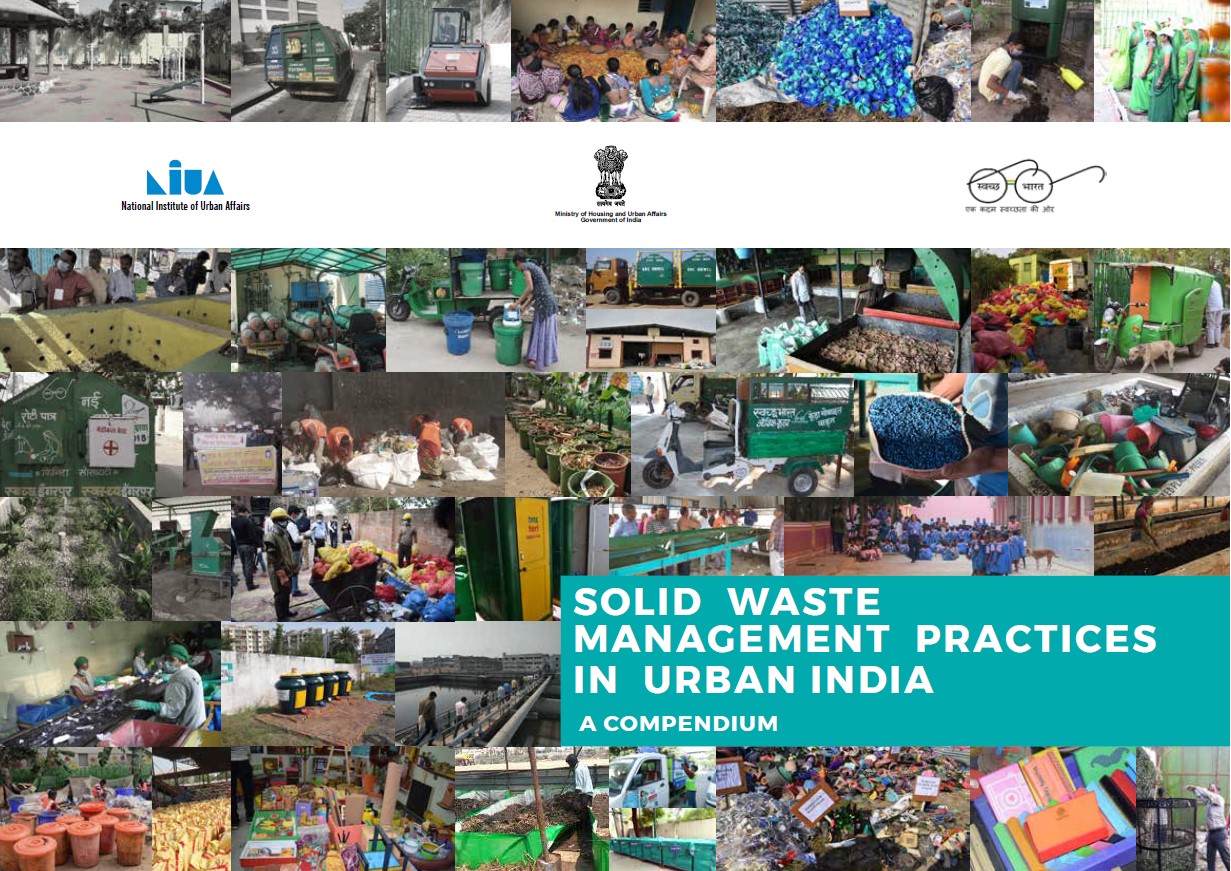Solid Waste Management
Waste management is one of the most enigmatic developmental challenges in India. Poor rationality around waste disposal has left many localities and landmasses, peri-urban spaces and water bodies polluted. According to the Swachhata Sandesh Newsletter (MoHUA), Delhi alone produces over 10,000 MT of solid waste per day, of which nearly 8000 MT is transported to landfill sites. Additionally, previous reports by MoEFCC and ICRIER showcased that out of the total waste generated, only 75-80% gets collected, and only 22-28% is processed. Increasing urbanization and population growth levels have only worsened the situation as per capita waste generation in India has increased from 0.26 kg/day to 0.85 kg/day (Kumar and Agrawal, 2020; CPCB India, 2018a). However, the Swachh Bharat Mission (SWM), initiated in 2014, aims to improve solid waste management techniques using modern technologies and augmenting the capacity building of ULBS. For instance, cities have set up crowdsourcing techniques and other technologically advanced solutions with NGOs, communities, and private organizations.
For instance: Indore - installed a bio-methanation plant that converts waste from the largest vegetable and fruit mandi to bio-CNG, which is used as fuel to run public transport buses. Bio-CNG is an economical and eco-friendly alternative to fuel and solves the twin motive of reducing the carbon footprint and generating wealth from waste. Bhopal installed smart sensors in bins. The GPS-enabled sensors send out signals to officials in the control room, who then send out municipal trucks to the location. Once the “smart bins” are emptied, the sanitation workers update the officials in the control room. Similarly, Chase App, conceptualized in a small town in Maharashtra- Mouda, effectively and efficiently monitors workers by giving out their real-time location, making waste collection smooth, swift, and transparent.
In Panaji, user charges have been linked to household and commercial waste collection. Each household or business entity is charged a sanitary fee further linked to the property tax filed by the residents. The Panaji Corporation has also established 6 Organic Waste Convertors (OWC) and 70 recycling units to manage wet and dry waste, respectively. (Kumar and Agrawal, 2020; Agarwal et al., 2015). Rajkot has installed Biomethanation plants in partnership with BARC to convert wet waste into compost. The city has also set up “Reverse Vending Machines," which issue discount coupons once the used bottles have been deposited. Similarly, in collaboration with Mango Foundation- a local NGO- Lucknow is transforming floral waste into incense sticks, aiming to empower women of the community involved in the initiative. Policies like SWM and Smart Cities Mission focus on institutionalizing the modern SWM practices using technological innovations, improving the waste-related physical and social infrastructure and cleaning the environment by reducing greenhouse gas emissions. However, municipalities are achieving limited success due to today's urban sprawl and the sociality attached to waste. Hence, decentralizing waste processing using technological solutions, citizens' sensitization, and proper qualitative and quantitative assessment of waste is the need of the hour.
Solutions
- Garbage Transfer Station (Segregation, Collection and Transportation of Solid Waste in Indore)
- Bin Free City Initiative (Segregation, Collection and Transportation of Solid Waste in Indore)
- Biomethanation Plant for Wholesale Vegetable and Fruit Market (Integrated Solid Waste Processing Facility in Indore)
- Material Recovery Facility (NEPRA: Let’s Recycle)
- Composting of Flower Waste (Brook and Blooms)
- Jatan : Working with young people
- Leaf Litter Processing Unit (LLPU Collection Process in Bengaluru)
- Leaf Litter Processing Unit (Processing at LLPU in Bengaluru)
- Coconut Waste Processing Unit, Freedom Park in Bengaluru
- Vermicomposting plant at Vellalore
- Biogas Plant at Amma Unavagam premises, North Zone
- Gasifier Crematorium at Najundapuram Area
- Micro Composting Centre at Central Market
- Home Composting at Sathya Elite Apartments and housing society in Ellis Nagar
- Waste Management at Meenakshi Temple
- Innovative recycling of waste by Hotel Temple City
- Bio-box technology at GRT Regency Hotel
- The Koyambedu Market Biogas Project
- Green Temple Initiative at Kapaleeswarar Temple, Mylapore
- Project Avthar by Exnora Green Pammal
- Integrated Solid Waste Management Facility at Khat Prakalp - Online monitoring of vehicle and weighing systems
- Integrated Solid Waste Management - Plastic to Fuel Plant
- Decentralised Waste Management at Roseland Society
- Sewage Gas based Power Generation at Bamroli
- Gajuwaka Solid Waste Transfer Unit
- Smart Covered Composting Technology
- Composting at Simhachalam Temple
- Decentralized composting at Tata Reality Infrastructures, Rambagh
- Waste to Energy Plant near I.D.H Hospital
- Scrapshala, Ravindrapuri
- Integration of Technology in Collection and Transportation, Jabalpur, Madhya Pradesh
- Solid and Liquid Resource Management (SLRM) Centre at Amritsar Cantonment Board
- Organic Waste Converter (OWC) at Trillium Mall
- Garden Waste Management
- Bioreactor Landfill, Integrated Solid Waste Management Facility, Municipal Corporation of Greater Mumbai
- Beach Cleaning initiative, Municipal Corporation of Greater Mumbai
- Floral waste to Incense Sticks, Mango Foundation
- Volunteers of the “Mazhi City Taka Tak” Campaign
- Bio-Methanation-cum Electricity Generation Plant
- Zero Waste Management (ZWM) Plant at Kumbarakoppal
- Vermicomposting and Biogas plant at Mysore Zoo
- Zero Waste Campus of Infosys
- Bio-methanation at National Institute of Engineering Campus
- Garden waste and domestic horticulture waste processing at Kanchi Nagar Park
- Dry Waste Collection Centre and Material Recovery Facility (MRF) at Thongum Poonga
- Decentralized Solid Waste Management at Heritage City, Sector 25
- Composting at Nandi Dham Cowshed
- Composting Plant, Jubilee Park
- Dry Waste Collection Centre, Bistupur
- Biogas Plant at Xavier School of Management (XLRI), Sakchi
- Recycling Plastic Waste to Construct Road
- Biomethanation at Kalinga Institute of Social Sciences (KISS) Campus
- Vermicomposting at Nandankanan Zoological Gardens
- Faecal Sludge and Septage Management (FSSM) Plant at Basuaghai
- Waste Warriors - Composting at Gandhi Park
- Decentralized composting at Madhuban Hotel, Rajpur road
- Non-Recyclable Multilayered Plastic Waste Recycling
- Plastic Bottle recycling by “Green Recycling Industry”















